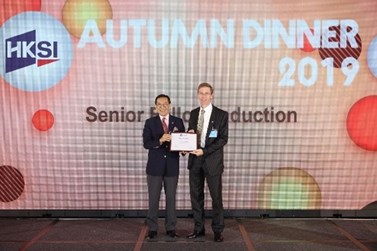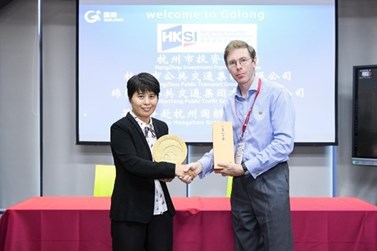Individual
Getting to Know Our Board Director – Mr Graham Cottingham

Senior Fellow Mr Graham Cottingham is a firm believer in helping others improve the quality of their knowledge and professional competence. He is in his second three-year term as HKSI Institute Board Director and has been actively involved in the Institute’s work over the years, including through the Individual Membership Committee, Education & Development Committee, Examinations Committee and the China Strategy Committee. Mr Cottingham is the Chief Executive Officer of Quartermain Group.
Q: Please tell us more about yourself.
A: I’m a qualified arbitrator, investment manager and trustee with 32 years of financial services and cross border trade experience.
After a stint at the United Kingdom’s Government Actuary’s Department, I worked in actuarial consultancy in London, with a focus on pensions and investment. Successive roles as analyst, product development manager, and fund manager ended up seeing me run a European listed fund house, which brought me to Hong Kong 25 years ago. My first role here was Group Chief Operations Officer for a large international financial and professional business services group, then Chairman of a similar organisation.
Eight years ago, I established Quartermain, providing wide ranging support services in cross border trade and investment, including arbitration and broader dispute resolution. We also administer family office interests, pensions and trusts.
Q: You have been active in the funds and pension sector in Hong Kong. What are your thoughts on the key challenges and opportunities for the sector in the coming years?
A: Recent years have been challenging in Hong Kong, between trade wars, political unrest and COVID-19 restrictions. Investors and businesses obviously prefer to minimise risk, and value freedom of movement, as do career minded high-flyers. Hong Kong consequently remains unattractive while travel restrictions and the so called “zero-COVID” policy continue, and this is undermining Hong Kong’s credibility and competitiveness as an international financial services centre.
Nevertheless, with adversity comes opportunity. Our experience has been that uncertainty about Hong Kong has increased corporate and investment restructuring and the demand for pensions and trusts has been higher from internationally mobile executives, whilst cross border trade and investment has been more complicated. We foresee continued increases in financial services disputes, for example, due to challenges in timely performance and stranded assets, as well as a booming political risk insurance market. This has encouraged us to expand our dispute resolution offerings to cover international trade and investment arbitration services.
ESG will remain a relevant theme too. We have been involved in many more renewable energy and energy conservation projects, some of which are great candidates for pension investments and at the same time help capacity building in parts of Asia that most need it. Since those projects are mostly in emerging markets, organising finance through Hong Kong offers better security to investors – even more so where China-sourced equipment is involved, given special provisions here for enforcing interim relief in China in the event of disputes.
Self-evidently, when normal travel resumes and confidence improves, the strengths of Hong Kong can be dusted off again. Our competitive tax system, respected legal infrastructure, geographic location, longstanding international finance and trade hub status, top ranking dispute resolution services and special terms of trade with China are unique and compelling.
On funds and pensions, I hope Hong Kong will do much more to innovate, including providing better resources for policymaking to allow us to catch up with progress in other markets and react more quickly to ever faster changes in technology and product development.
For example, Hong Kong could update pensions legislation for Occupational Retirement Schemes Ordinance (ORSO) schemes, since they are so much more attractive than MPF arrangements and need to be extended to allow personal pension accounts if Hong Kong is to offer competitive reward strategies and improve social security. If this is done thoughtfully, it could generate trillions of dollars in international pension fund holdings in Hong Kong and would be a huge boost for the financial services industry.
An example of an opportunity for fund innovation would be institutional third-party funding for dispute resolution, following recent changes here to allow this. Such arrangements provide an alternative to conventional investments whilst ensuring legitimate disputes become affordable, instead of many smaller investors losing out, even where fraud or negligence by fund managers is evident. Having recently represented investors as a trustee bringing insolvency actions in similar circumstances, I can testify to the value that funding arrangements could have here.
Q: This is your second three-year term of Board Directorship at the HKSI Institute, representing the Investment Analysts Group sector. What appeals to you about board service at the HKSI Institute?
A: Since HKSI Institute is the examiner and a key training agency for SFC regulated practitioners, we have a tremendous responsibility to help maintain and improve industry standards, and also provide a melting pot for exchange of information and ideas. That contributes to maintaining Hong Kong as a respected international financial services centre whilst helping thousands of people every year improve the quality of their knowledge and professional competence, allowing them to improve their prospects. It is a privilege to be a part of that, with the support of a great team of HKSI Institute staff, co-directors and committee colleagues, and to see how much the Institute has grown over the years.
Q: You are a strong proponent of lifelong learning. How could HKSI Institute play a key role in supporting the professional development of practitioners in Hong Kong?
A: Every year HKSI Institute has been expanding its continuous professional training (CPT) development programmes and examinations to cover more and more industry specialisms and emerging innovations. For example, it has been amongst the first to address the emerging interests in ESG and digital assets. Whatever your interest, you’re likely to find that HKSI Institute has the relevant content for you, whether you are new to financial services or a seasoned practitioner.
 |
 |
